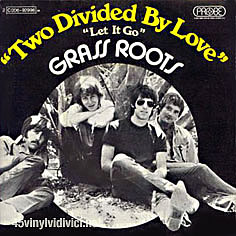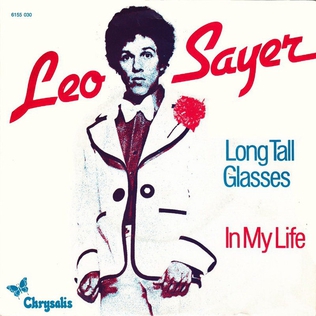
"Ain't Nothing Like the Real Thing" is a 1968 single released by American R&B/soul duo Marvin Gaye and Tammi Terrell, on the Tamla label in 1968. The B-side of the single is "Little Ole Boy, Little Ole Girl" from the duo's United LP. The first release off the duo's second album: You're All I Need, the song—written and produced by regular Gaye/Terrell collaborators Ashford & Simpson—became a hit within weeks of release eventually peaking at number eight on the US Billboard Hot 100 and number one on the Hot Soul Singles chart, the first of the duo's two number-one R&B hits. In the UK "Ain't Nothing Like the Real Thing" reached number 34.

"One Tin Soldier" is a 1960s counterculture era anti-war song written by Dennis Lambert and Brian Potter. Canadian pop group The Original Caste first recorded it in 1969 for both the TA label and its parent Bell label.

"Smokin' in the Boys Room" is a song originally recorded by Brownsville Station in 1973 on their album Yeah!. It reached number 3 in Canada and on the US Billboard Hot 100, and was later certified by the RIAA.

"Saturday Night" is a song recorded by the Scottish pop rock band Bay City Rollers. It was written and produced by Bill Martin and Phil Coulter. The tune is an upbeat rock number with a memorable hook, in which the word "Saturday" is spelled out in a rhythmic, enthusiastic chant.

"Go Away Little Girl" is a popular song written by Gerry Goffin and Carole King. It was first recorded by Bobby Vee for Liberty Records on March 28, 1962. The lyrics consist of a young man asking a young attractive woman to stay away from him, so that he will not be tempted to betray his steady girlfriend by kissing her. The song is notable for making the American Top 20 three times: for Steve Lawrence in 1963, for The Happenings in 1966, and for Donny Osmond in 1971. It is also the first song, and one of only nine, to reach US number 1 by two different artists. Also notable in each of the solo versions is the similar double-tracked treatment of the singer's voice.

"This Masquerade" is a song written by American singer and musician Leon Russell. It was originally recorded in 1972 by Russell for his album Carney and as a B-side for the album's hit single "Tight Rope". The song was then covered on Helen Reddy's 1972 album, I Am Woman. It was then recorded by American vocal duo, the Carpenters, for their 1973 album Now & Then and as the B-side of the Carpenters's single "Please Mr. Postman". Three years later, "This Masquerade" was recorded by American singer and guitarist George Benson, who released it on his 1976 album, Breezin'. Benson's version, featuring Jorge Dalto on piano, was released as a single and became the first big hit of his career.

"Show and Tell" is a popular song written by Jerry Fuller and first recorded by Johnny Mathis in 1972. This original version made it to #36 on the Easy Listening chart.

"This Is It" is a song by American musician Kenny Loggins. It was released in 1979 as the lead single from his 1979 album Keep the Fire. It reached number 11 on the Billboard Hot 100 and number 17 on the Adult Contemporary chart. "This Is It" was also successful on the Hot Soul Singles chart, reaching number 19; it was one of two entries on this chart.

"Jean" is a popular song from the 1969 movie The Prime of Miss Jean Brodie. It was written by the American poet and composer Rod McKuen, who also recorded a version of the song.

"Sweet Hitch-Hiker" is a song by the American roots/swamp rock band Creedence Clearwater Revival from their 1972 album Mardi Gras. It was first released as a single in 1971 and reached #6 on the Billboard Hot 100, becoming their 9th and last top 10 hit. On the Record Retailer UK Singles Chart, it peaked at #36.

"Love Won't Let Me Wait" is a hit 1975 single by Major Harris, a former member of R&B/soul group The Delfonics. Written by Vinnie Barrett and Bobby Eli, the single is considered to be a staple of classic soul playlists, and was Harris' only entry into the top five on both the soul and pop charts. The single hit number five on the pop chart, and also hit number one on the soul chart for one week. Billboard ranked it as the No. 24 song for 1975. It was awarded a gold disc by the R.I.A.A. on 25 June 1975.

"Let Her In" is a song written and recorded by English singer-songwriter Gary Benson, and released as a single in 1973. It was covered by John Travolta in 1976, and was released as the first single from Travolta's self-titled second album. Travolta's version was a hit, spending five months on the U.S. Billboard Hot 100, and peaking at number 10. It also reached number 16 on the Adult Contemporary chart. On the Cash Box chart, the song peaked at number five. In Canada, "Let Her In" reached number seven on the RPM Top Singles chart.

"Clap for the Wolfman" is a song written by Burton Cummings, Bill Wallace, and Kurt Winter performed by their band, the Guess Who. The song appeared on their 1974 album, Road Food. The song was ranked #84 on Billboard magazine's Top Hot 100 songs of 1974.

"Never Ending Song of Love" is a song written by Delaney Bramlett, and, according to some sources, by his wife Bonnie Bramlett. It was originally recorded with their band, Delaney & Bonnie & Friends, in 1971 on the album Motel Shot. Released as a single by Atco Records the same year, "Never Ending Song of Love" became Delaney & Bonnie's greatest hit on the pop charts, reaching a peak of No. 13 on the Billboard Hot 100 and No. 8 on Easy Listening. It reached No. 16 in Australia.

"Two Divided by Love" is a 1971 hit song by The Grass Roots. It was the first single released from their sixth studio album, Move Along.

"Thunder and Lightning" is a 1972 song by American singer and pianist Chi Coltrane. It was the first release from her eponymous debut album, peaking at No. 17 on the US Billboard Hot 100, No. 15 on Cash Box and No. 12 on Record World. It also charted at No. 18 on the Canadian RPM magazine singles chart.

"Long Tall Glasses (I Can Dance)" is a 1974 song by Leo Sayer, co-written with David Courtney. It was released in the United Kingdom in late 1974, becoming Sayer's third hit record on both the British and Irish singles charts and reaching number four in both nations. It was included on Sayer's album Just a Boy.

"Pretty Lady" is a 1973 song by Canadian rock band Lighthouse. The song was the lead single of three released from their Can You Feel It LP. It was written by lead singer Skip Prokop.

"Only You Know and I Know" is a song written and originally recorded by Dave Mason in 1970. It is a track from his LP, Alone Together. The song was his first charting single, and it became a modest hit for him in the U.S. and Canada.

"The Drum" is a song recorded by Bobby Sherman from his Portrait Of Bobby LP. It was released as a single in the spring of 1971, the second of two from the album. The song was written by Alan O'Day, his first of five Top 40 chart credits.




















